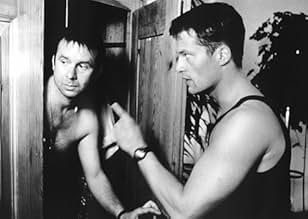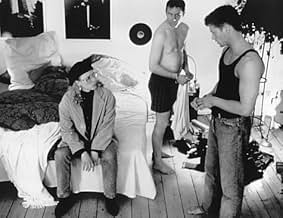NOTE IMDb
6,5/10
6,5 k
MA NOTE
Ajouter une intrigue dans votre langueThrown out by his girlfriend from her apartment, Axel lives for a while with Norbert, a gay man he met some days before.Thrown out by his girlfriend from her apartment, Axel lives for a while with Norbert, a gay man he met some days before.Thrown out by his girlfriend from her apartment, Axel lives for a while with Norbert, a gay man he met some days before.
- Réalisation
- Scénario
- Casting principal
- Récompenses
- 10 victoires et 1 nomination au total
Helmut Buchel
- Dirk
- (as Helmut Büchel)
Avis à la une
I saw this film in Germany when it came out as I was living there at the time. It was one of the funniest films I ever saw. Some years later I got a subtitled copy back in England and was shocked at how unfunny it was when translated. Which goes to show that humour often only works in the language it was created in.
That said, it is still a very unstylised view of culture clashes and a study of how far people are prepared to go when they aren't getting any sex. No one gets what they want by the end: the gay man doesn't get his straight friend; the straight man doesn't get his free-love lifestyle; the straight woman doesn't get her angry singledom.
I guess the moral is that you can take the human out of their sexuality, but you can't take the sexuality out of the human. Trite, but it reflects the title of the film, referring to a proverbial fish out of water.
That said, it is still a very unstylised view of culture clashes and a study of how far people are prepared to go when they aren't getting any sex. No one gets what they want by the end: the gay man doesn't get his straight friend; the straight man doesn't get his free-love lifestyle; the straight woman doesn't get her angry singledom.
I guess the moral is that you can take the human out of their sexuality, but you can't take the sexuality out of the human. Trite, but it reflects the title of the film, referring to a proverbial fish out of water.
`Maybe, Maybe Not' is one of the most odd movies I've ever seen. I liked it. I think I liked it because it is so completely different than all the American movies I'm used to seeing. In the beginning, the main character, Axel, decides to randomly have sex with some girl in the bathroom of his workplace. A woman in the next stall recognizes the key chain that dropped from one of the fornicating couple's clothes. She peeks over the stall to find her boyfriend of three years mindlessly humping another woman. She kicks him out of their apartment and throughout the rest of the movie he struggles with where to live. Initially he calls old girlfriends who all readily turn him away. Then he ends up at a `men's group' with a lot of gay guys. After that, he gets drunk at a party and goes home to sleep at one of their houses. This is when the gender preference battle begins. A lot of stereotypes were defied in this movie and I found that extremely refreshing. For example, it is commonly thought in American society that gay men are promiscuous, however in this movie, no homosexual sex is shown. There is one man-to-man kiss in the club and in another scene homosexual activity is inferred while watching slides but not directly shown on the screen. There are, however, two comparatively graphic heterosexual scenes. Another stereotype defied was the `effeminate gay men' stereotype. The main gay character, Norbert, didn't act effeminate at all, not even in drag. My favorite part of the movie however perpetuated and made fun of an existing stereotype - the stupid Stallone-loving straight guy. The guys in the movie theater were very intriguing. I thought they added welcome comic relief to an otherwise tense and dark movie.
This film is about a man's life turning upside down after spending the night in a gay man's house.
This film is so funny! The acting is great, the two lead characters, Axel and Norbert are outstanding. Axel is a man who cannot say no to temptation. Norbert, is a secret admirer of Axel. He is cute and hilarious. Axel's wife, Doro, accidentally discovers her husband befriending Norbert. One coincidence after another, she becomes convinced of her husband's homosexuality.
The plot is also very good. Though I can only catch German isolated phrases here and there, I still find the film entertaining. I laughed out loud many times. The sets are also decorated nicely, each of the apartments are set up so that they really feel like a home sweet home. Apart from being entertaining, it also promotes tolerance and diversity.
This film is so funny! The acting is great, the two lead characters, Axel and Norbert are outstanding. Axel is a man who cannot say no to temptation. Norbert, is a secret admirer of Axel. He is cute and hilarious. Axel's wife, Doro, accidentally discovers her husband befriending Norbert. One coincidence after another, she becomes convinced of her husband's homosexuality.
The plot is also very good. Though I can only catch German isolated phrases here and there, I still find the film entertaining. I laughed out loud many times. The sets are also decorated nicely, each of the apartments are set up so that they really feel like a home sweet home. Apart from being entertaining, it also promotes tolerance and diversity.
This is yet another of those cases where Anglosaxon audiences might be tempted to think that it reenforces their prejudice that German humour is a no-show.
The problem can be described in one word: subtitles. I (a native German speaker) watched the UK release which is the original German version with English subtitles. The dialogue of this film is very funny and sharp; it is quite different from contemporary funny English dialogue which usually goes for funny one-liners, it has more in common with the humour you find in Oscar Wilde, for example in The Importance of Being Earnest. In other words, the characters are constantly trying to (literally) outwit each other whilst keeping the conversation afloat. This kind of dialogue is quite fashionable in certain parts of German culture, but at least in Britain it has become fairly rare. Consequently, the translators had a difficult job on their hands.
Occasionally my eyes wandered towards the subtitles to see what the translators did with the latest banter - and I was appalled with what I found. Yes, the translation was factually accurate, i.e. the content of what was said was accurately translated, but all the wit, the sharpness, the humour had gone. As already mentioned, this was a difficult translation job, but the translators did not try hard enough.
The problem can be described in one word: subtitles. I (a native German speaker) watched the UK release which is the original German version with English subtitles. The dialogue of this film is very funny and sharp; it is quite different from contemporary funny English dialogue which usually goes for funny one-liners, it has more in common with the humour you find in Oscar Wilde, for example in The Importance of Being Earnest. In other words, the characters are constantly trying to (literally) outwit each other whilst keeping the conversation afloat. This kind of dialogue is quite fashionable in certain parts of German culture, but at least in Britain it has become fairly rare. Consequently, the translators had a difficult job on their hands.
Occasionally my eyes wandered towards the subtitles to see what the translators did with the latest banter - and I was appalled with what I found. Yes, the translation was factually accurate, i.e. the content of what was said was accurately translated, but all the wit, the sharpness, the humour had gone. As already mentioned, this was a difficult translation job, but the translators did not try hard enough.
Based on the work of Ralf König -- the king (no pun intended) of the Teutonic queer comic strip -- Wortmann has made a film about the vicissitudes of coming out. Hand in hand, these two men from the country of "poets and thinkers" dare utter the words: "we are German, we are funny, and we are not ashamed!" In case you missed Wortmann's "Kleine Haie" (1992) -- a road film about three young men coming to grips with their thespianism -- here's proof that comedy is not merely a genre inflicted unilaterally by Hollywood on the rest of the world. Although this film does make concessions in order to be more palatable to its hetero viewership, it is clearly head-and-shoulders above recent Hollywood forays into the queer-exploitation venue such as the abysmal "In&Out" featuring Kevin Kline. After Fassbinder and Wenders it now looks like Germany has a commercially viable director with something worthwhile to say!
Le saviez-vous
- AnecdotesAt the time of release, this was the biggest grossing homegrown film at the German box office. It was also the third-highest successful movie that year overall, after Forrest Gump (1994) and Le Roi lion (1994).
- Citations
Doro Feldheim: [after hanged up the phone hearing a male voice] That was a man!
Jutta: So, in addition she's married.
Doro Feldheim: [hysterical] That was a homosexual guy!
- ConnexionsFeatured in Wa(h)re Liebe: Épisode datant du 20 octobre 1994 (1994)
- Bandes originalesJa und nein
Music by Franz Grothe
Lyrics by Willy Dehmel
Performed by Palast Orchester featuring Max Raabe
Meilleurs choix
Connectez-vous pour évaluer et suivre la liste de favoris afin de recevoir des recommandations personnalisées
- How long is Maybe... Maybe Not?Alimenté par Alexa
Détails
Box-office
- Montant brut aux États-Unis et au Canada
- 468 930 $US
- Montant brut mondial
- 468 930 $US
Contribuer à cette page
Suggérer une modification ou ajouter du contenu manquant

Lacune principale
By what name was Les nouveaux mecs (1994) officially released in India in English?
Répondre




























